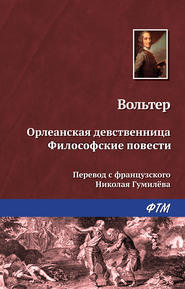По всем вопросам обращайтесь на: info@litportal.ru
(©) 2003-2024.
✖
A Philosophical Dictionary, Volume 09
Настройки чтения
Размер шрифта
Высота строк
Поля
The same author says, that the Romans conquered the Galatians; but they did not conquer Galatia for more than a hundred years after. Thus the unhappy story-teller did not write for more than a hundred years after the time in which it was supposed that he wrote: and it is thus, according to the infidels, with almost all the Jewish books.
The same author observes, that the Romans every year nominated a chief of the senate. Behold a well-informed man, who did not even know that Rome had two consuls! What reliance, say infidels, can be placed in these rhapsodies and puerile tales, strung together without choice or order by the most imbecile of men? How shameful to believe in them! and the barbarity of persecuting sensible men, in order to force a belief of miserable absurdities, for which they could not but entertain the most sovereign contempt, is equal to that of cannibals.
Our answer is, that some mistakes which probably arose from the copyists may not affect the fundamental truths of the remainder; that the Holy Ghost inspired the author only, and not the copyists; that if the Council of Laodicea rejected the Maccabees, they have been admitted by the Council of Trent; that they are admitted by the Roman Church; and consequently that we ought to receive them with due submission.
Of the Origin of Purgatory.
It is certain that those who admitted of purgatory in the primitive church were treated as heretics. The Simonians were condemned who admitted the purgation of souls —Psuken Kadaron.
St. Augustine has since condemned the followers of Origen who maintained this doctrine. But the Simonians and the Origenists had taken their purgatory from Virgil, Plato and the Egyptians. You will find it clearly indicated in the sixth book of the "Æneid," as we have already remarked. What is still more singular, Virgil describes souls suspended in air, others burned, and others drowned:
Aliæ panduntur inanes
Suspensæ ad ventos: aliis sub gurgite vasto
Infectum eluitur scelus, aut exuritur igni.
– &ÆNEID, Book vi, 740-742.
For this are various penances enjoined,
And some are hung to bleach upon the wind;
Some plunged in waters, others purged in fires,
Till all the dregs are drained, and all the rust expires.
– DRYDEN.
And what is more singular still, Pope Gregory, surnamed the great, not only adopts this doctrine from Virgil, but in his theology introduces many souls who arrive from purgatory after having been hanged or drowned.
Plato has spoken of purgatory in his "Phædon," and it is easy to discover, by a perusal of "Hermes Trismegistus" that Plato borrowed from the Egyptians all which he had not borrowed from Timæus of Locris.
All this is very recent, and of yesterday, in comparison with the ancient Brahmins. The latter, it must be confessed, invented purgatory in the same manner as they invented the revolt and fall of the genii or celestial intelligences.
It is in their Shasta, or Shastabad, written three thousand years before the vulgar era, that you, my dear reader, will discover the doctrine of purgatory. The rebel angels, of whom the history was copied among the Jews in the time of the rabbin Gamaliel, were condemned by the Eternal and His Son, to a thousand years of purgatory, after which God pardoned and made them men. This we have already said, dear reader, as also that the Brahmins found eternal punishment too severe, as eternity never concludes. The Brahmins thought like the Abbé Chaulieu, and called upon the Lord to pardon them, if, impressed with His bounties, they could not be brought to conceive that they would be punished so rigorously for vain pleasures, which passed away like a dream:
Pardonne alors, Seigneur, si, plein de tes bontés
Je n'ai pu concevoir que mes fragilités,
Ni tous ces vains plaisirs que passent comme un songe,
Pussent être l'objet de tes sévérités;
Et si j'ai pu penser que tant des cruautés.
Puniraient un peu trop la douceur d'un mensonge.
– EPITRE SUR LA MORT, au Marquis de la Fare.
QUACK (OR CHARLATAN)
The abode of physicians is in large towns; there are scarcely any in country places. Great towns contain rich patients; debauchery, excess at the tables, and the passions, cause their maladies. Dumoulin, the physician, who was in as much practice as any of his profession, said when dying that he left two great physicians behind him – simple diet and soft water.
In 1728, in the time of Law, the most famous of quacks of the first class, another named Villars, confided to some friends, that his uncle, who had lived to the age of nearly a hundred, and who was then killed by an accident, had left him the secret of a water which could easily prolong life to the age of one hundred and fifty, provided sobriety was attended to. When a funeral passed, he affected to shrug up his shoulders in pity: "Had the deceased," he exclaimed, "but drank my water, he would not be where he is." His friends, to whom he generously imparted it, and who attended a little to the regimen prescribed, found themselves well, and cried it up. He then sold it for six francs the bottle, and the sale was prodigious. It was the water of the Seine, impregnated with a small quantity of nitre, and those who took it and confined themselves a little to the regimen, but above all those who were born with a good constitution, in a short time recovered perfect health. He said to others: "It is your own fault if you are not perfectly cured. You have been intemperate and incontinent, correct yourself of these two vices, and you will live a hundred and fifty years at least." Several did so, and the fortune of this good quack augmented with his reputation. The enthusiastic Abbé de Pons ranked him much above his namesake, Marshal Villars. "He caused the death of men," he observed to him, "whereas you make men live."
It being at last discovered that the water of Villars was only river water, people took no more of it, and resorted to other quacks in lieu of him. It is certain that he did much good, and he can only be accused of selling the Seine water too dear. He advised men to temperance, and so far was superior to the apothecary Arnault, who amused Europe with the farce of his specific against apoplexy, without recommending any virtue.
I knew a physician of London named Brown, who had practised at Barbadoes. He had a sugar-house and negroes, and the latter stole from him a considerable sum. He accordingly assembled his negroes together, and thus addressed them: "My friends," said he to them, "the great serpent has appeared to me during the night, and has informed me that the thief has at this moment a paroquet's feather at the end of his nose." The criminal instantly applied his hand to his nose. "It is thou who hast robbed me," exclaimed the master; "the great serpent has just informed me so;" and he recovered his money. This quackery is scarcely condemnable, but then it is applicable only to negroes.
The first Scipio Africanus, a very different person from the physician Brown, made his soldiers believe that he was inspired by the gods. This grand charlatanism was in use for a long time. Was Scipio to be blamed for assisting himself by the means of this pretension? He was possibly the man who did most honor to the Roman republic; but why the gods should inspire him has never been explained.
Numa did better: he civilized robbers, and swayed a senate composed of a portion of them which was the most difficult to govern. If he had proposed his laws to the assembled tribes, the assassins of his predecessor would have started a thousand difficulties. He addressed himself to the goddess Egeria, who favored him with pandects from Jupiter; he was obeyed without a murmur, and reigned happily. His instructions were sound, his charlatanism did good; but if some secret enemy had discovered his knavery, and had said, "Let us exterminate an impostor who prostitutes the names of the gods in order to deceive men," he would have run the risk of being sent to heaven like Romulus. It is probable that Numa took his measures ably, and that he deceived the Romans for their own benefit, by a policy adapted to the time, the place, and the early manners of the people.
Mahomet was twenty times on the point of failure, but at length succeeded with the Arabs of Medina, who believed him the intimate friend of the angel Gabriel. If any one at present was to announce in Constantinople that he was favored by the angel Raphael, who is superior to Gabriel in dignity, and that he alone was to be believed, he would be publicly empaled. Quacks should know their time.
Was there not a little quackery in Socrates with his familiar dæmon, and the express declaration of Apollo, that he was the wisest of all men? How can Rollin in his history reason from this oracle? Why not inform youth that it was a pure imposition? Socrates chose his time ill: about a hundred years before he might have governed Athens.
Every chief of a sect in philosophy has been a little of a quack; but the greatest of all have been those who have aspired to govern. Cromwell was the most terrible of all quacks, and appeared precisely at a time in which he could succeed. Under Elizabeth he would have been hanged; under Charles II., laughed at. Fortunately for himself he came at a time when people were disgusted with kings: his son followed, when they were weary of protectors.
Of the Quackery of Sciences and of Literature.
The followers of science have never been able to dispense with quackery. Each would have his opinions prevail; the subtle doctor would eclipse the angelic doctor, and the profound doctor would reign alone. Everyone erects his own system of physics, metaphysics, and scholastic theology; and the question is, who will value his merchandise? You have dependants who cry it up, fools who believe you, and protectors on whom to lean. Can there be greater quackery than the substitution of words for things, or than a wish to make others believe what we do not believe ourselves?
One establishes vortices of subtile matter, branched, globular, and tubular; another, elements of matter which are not matter, and a pre-established harmony which makes the clock of the body sound the hour, when the needle of the clock of the soul is duly pointed. These chimeras found partisans for many years, and when these ideas went out of fashion, new pretenders to inspiration mounted upon the ambulatory stage. They banished the germs of the world, asserted that the sea produced mountains, and that men were formerly fishes.
How much quackery has always pervaded history: either by astonishing the reader with prodigies, tickling the malignity of human nature with satire, or by flattering the families of tyrants with infamous eulogies!
The unhappy class who write in order to live, are quacks of another kind. A poor man who has no trade, and has had the misfortune to have been at college, thinks that he knows how to write, and repairing to a neighboring bookseller, demands employment. The bookseller knows that most persons keeping houses are desirous of small libraries, and require abridgments and new tables, orders an abridgment of the history of Rapin Thoyras, or of the church; a collection of bon mots from the Menagiana, or a dictionary of great men, in which some obscure pedant is placed by the side of Cicero, and a sonneteer of Italy as near as possible to Virgil.
Another bookseller will order romances or the translation of romances. If you have no invention, he will say to his workman: You can collect adventures from the grand Cyrus, from Gusman d'Alfarache, from the "Secret Memoirs of a Man of Quality" or of a "Woman of Quality"; and from the total you will make a volume of four hundred pages.
Another bookseller gives ten years' newspapers and almanacs to a man of genius, and says: You will make an abstract from all that, and in three months bring it me under the name of a faithful "History of the Times," by M. le Chevalier – , Lieutenant de Vaisseau, employed in the office for foreign affairs.
Of this sort of books there are about fifty thousand in Europe, and the labor still goes on like the secret for whitening the skin, blackening the hair, and mixing up the universal remedy.
RAVAILLAC
I knew in my infancy a canon of Péronne of the age of ninety-two years, who had been educated by one of the most furious burghers of the League – he always used to say, the late M. de Ravaillac. This canon had preserved many curious manuscripts of the apostolic times, although they did little honor to his party. The following is one of them, which he bequeathed to my uncle:
Dialogue of a Page of the Duke of Sully, and of Master Filesac, Doctor of the Sorbonne, one of the two Confessors of Ravaillac.
MASTER FILESAC. – God be thanked, my dear page, Ravaillac has died like a saint. I heard his confession; he repented of his sin, and determined no more to fall into it. He wished to receive the holy sacrament, but it is not the custom here as at Rome; his penitence will serve in lieu of it, and it is certain that he is in paradise.
PAGE. – He in paradise, in the Garden of Eden, the monster!
MASTER FILESAC. – Yes, my fine lad, in that garden, or heaven, it is the same thing.
PAGE. – I believe so; but he has taken a bad road to arrive there.
MASTER FILESAC. – You talk like a young Huguenot. Learn that what I say to you partakes of faith. He possessed attrition, and attrition, joined to the sacrament of confession, infallibly works out the salvation which conducts straightway to paradise, where he is now praying to God for you.
PAGE. – I have no wish that he should address God on my account. Let him go to the devil with his prayers and his attrition.
MASTER FILESAC. – At the bottom, he was a good soul; his zeal led him to commit evil, but it was not with a bad intention. In all his interrogatories, he replied that he assassinated the king only because he was about to make war on the pope, and that he did so to serve God. His sentiments were very Christian-like. He is saved, I tell you; he was bound, and I have unbound him.
PAGE. – In good faith, the more I listen to you the more I regard you as a man bound yourself. You excite horror in me.
MASTER FILESAC. – It is because that you are not yet in the right way; but you will be one day. I have always said that you were not far from the kingdom of heaven; but your time is not yet come.















